- Home
- Julie Smith
Louisiana Bigshot Page 8
Louisiana Bigshot Read online
Page 8
“Why not?”
“Oh, they sent her asshole brother down here, threatening to haul her ass off to the bin. Had to deck him to get rid of him.”
Robineau’d probably decked Clayton too, quite a few times, which might explain why she’d made her will—she was afraid of dying and didn’t want Mr. Wonderful to benefit. But if she was suicidal, how had she summoned the courage to get out of the marriage?
“She was one sad sack of a woman.” Robineau lit another cigarette, shook the match out and gazed at the blue smoke as if it were inducing a trance, taking him back to a life he’d all but forgotten. His own face was sad as he spoke.
“She always said I didn’t love her. Now why did she do that? Nobody could have loved her more than I did. I’d tell her that, ask her why she said it, and she’d say nobody could love her, that she wasn’t loveable. You imagine anybody saying that? What the hell’s a thing like that about?”
Talba was silent, wondering the same thing. Every family had an outcast, whether or not he lived at home—Talba’s father was the one in her family. Babalu seemed to have been literally cast out.
Talba began to gather up her belongings in as officious a manner as she could muster. “Mr. Robineau, you’ve been very kind. I’m sorry to bring up such an unpleasant subject, but we were wondering if you know if Clayton made a will?”
He pulled back in an almost literal double-take. “Me? How would I know?”
She stood, afraid he was going to do the mad-bull turn again. “Well, it was a long shot. We haven’t been able to find one, and we have to turn over every rock. I’m sure you understand.”
Instead of getting violent, Robineau went childish on her. His mouth turned down, and his shoulders drooped. He removed the cigarette from his lips, as if the pleasure had gone out of smoking it. “I thought you came to tell me she’d left me something.”
Talba gave him a professional shrug. “Well, I wouldn’t rule it out at this point. We’ll let you know as soon as we locate a will.”
Liar, liar, pants on fire. Eddie’d taught her well.
There were times when Eddie thought maybe it was worth it to go back to computer-wrangling. Never, in all the years since he’d hung out his shingle, had he had a client die on him—certainly not the day after he turned in his report.
Though he could not, hard as he tried, make this Ms. Wallis’s fault, it still griped him. He wondered, not for the first time, if she was more trouble than she was worth. But he had had the temerity to mention this at dinner the night before, when his daughter Angie happened to be over, only to be met with a double female chorus of ridicule, from Angie and Audrey both. He could see why Angie felt this way—she and Ms. Wallis were two peas in a pod, except they were different colors—but why Audrey took up for Ms. Wallis was beyond him. What she said was that having competent help lowered his blood pressure, and what he said was, it damn sure might if he could just find any.
Usually, that was just banter, though, because he really did appreciate Ms. Wallis’s computer skills. Not only that, he liked her voice. She might have the most beautiful voice of any woman he’d ever heard. It was so smooth and sugary and thick (yet tangy), it reminded him of butterscotch. If she’d ever write something pretty instead of that angry-black-girl stuff, she’d probably become an international star and leave on her own accord.
But for now, he was stuck with her—her and her dead client and the damn GPS she’d installed in his car. At least she had the good sense to consult him about what to do now. She was in his office, running it down for him—what the boyfriend (AKA “the new client”) said, what the ex-husband said, what the cops thought. And now she was talking about going to some fancy-schmancy funeral in a town with the same name as the stiff. Who’d have guessed Tammy Tattoo was a runaway debutante?
He needed time to think. “Ms. Wallis, ya really think it’s wise?”
“That’s what I’m asking you, Eddie. I think it’s a pretty bizarre request.”
He shrugged. “Well, it’s billable.”
“This is about ethics, I thought. Is there some reason I shouldn’t go? I mean, the family hates him—he’s already said his reason for taking me is to keep them from throwing him out.”
Suddenly it came clear to him. “Look at it this way, Ms. Wallis. Ya first loyalty is to ya client. It really don’t make no never-mind what the family thinks. They’re not ya client.”
“On the other hand, if I’ve got to investigate this thing, I don’t want to alienate them.”
“ ‘Alienate’ ’em. Can I ask ya something—you always gotta use a five-dollar word when a two-bit one’ll do?”
“Always.” She smiled at him, and he had the odd sensation she thought he was cute. Not cute like a hunk—cute like an amusing old geezer. It wasn’t a cheering thought.
He flapped his arms. “Just go and be your own sweet self,” he said. “Isn’t that what Miz Clara would say?”
She looked him in the eye, the pretty smile gone, a perfect “11” over her nose. “Eddie, you think I’m wasting my time here? The police say it’s suicide and the ex says it’s suicide (although anybody’d be suicidal if they were married to him). Am I wasting this guy’s money?”
“Well, what do you think?”
She covered the bottom half of her face with her hands and thought into the little pocket thus created. Finally, she said, “I don’t think so. She was too hopeful a person, too positive to commit suicide. But on the other hand, I just can’t imagine anybody who’d want to kill her.”
“Well, her family hated her, right? Then there was the boyfriend’s girlfriend. Oh, yeah, and the ex who thought he was going to get something when she died. Hey, how about the sister who was actually named in the will? Maybe she plays the ponies or something.”
“Eddie, are you making fun of me?”
He wasn’t, actually. He was perfectly serious. “For Christ’s sake, Ms. Wallis. Just round up the usual suspects.”
“I bow,” she said, “to your superior wisdom.” And she actually did bow.
“For Christ’s sake,” he said again.
Chapter Eight
Her favorite thing about Eddie was the way he embarrassed so easily. Of course, it could be a pain when she wanted to exercise her usual vocabulary—as far as he was concerned public nakedness was preferable to profanity within the hearing of both sexes. But it was such sport to heap him with extravagant compliments and watch him squirm.
Besides, she really did respect him. He’d taught her a lot, despite being a royal pain. If he said go to the funeral, Talba would go. Babalu was her friend, she might have gone anyway.
But one more thing to do first—it might help with the family to meet Mary Pat, get her on Talba’s side. She could phone, but she was learning more and more that showing up on someone’s doorstep was usually far the greater learning experience. If they tried to throw you out, they usually had something to hide, which was instructive in itself. If they didn’t, you got a lot of bandwidth—appearance, expressions, body language, some sense of financial position and demographics, stuff you couldn’t get on the phone. Eddie even claimed there were ways to tell if someone was lying—something to do with looking right, or maybe it was left. Not only couldn’t she remember which direction it was, she couldn’t even think to look and see if they did it. But you learned stuff, anyhow—like in the case of Rob Robineau. A drunken, druggie, arrogant, violent, lowlife burnout. Would all that have come through on the phone?
What on earth had Babalu seen in him? Maybe she thought he reminded her of her daddy. It was so often the case.
Obviously, from the bequest, Mary Pat was also a body-worker. She was much as Jason had described her, except that today she wasn’t dressed like a gypsy, unless the gypsies had changed their national dress to overalls. “Cleaning,” she said, waving a cloth. “It’s what I do to relieve depression. Other people exercise, but that one’s against my religion. I’m about to have a Diet Coke.” Seeing Talba’s expressio
n, she said, “Listen, no one in the world’s as pure as Babalu, certainly not little moi, and certainly not today. Want to split one with me?”
Talba couldn’t help smiling. “Sure.”
Mary Pat sat her down in a living room as cluttered as Babalu’s was stark. “I’m glad to see you,” she said. “I know Babalu thought the world of you—Clayton, I mean. We’re going to have to get used to calling her Clayton if we’re going to Clayton. You headed there? Want to go together?”
“I promised Jason I’d go with him. We could all go together if you like.”
Mary Pat shook her head. “I can’t. Sorry, but I’m too mad at him. I don’t blame the family—I think he should stay away.”
“You know about his hiring me, I presume?”
Mary Pat nodded, causing a pair of long beaded earrings to swing as if caught in a high wind, but she didn’t comment. “Well? Do you think it’s a bad idea?”
She shook her head as vigorously as she’d nodded, making the earrings change direction. “I’d love to believe Clayton didn’t kill herself—but, face it, she had reason. I think he’s just trying to assuage his guilt.”
“You sound as if you don’t like him.”
“Under the circumstances, do you?”
Talba thought about it. “His pain is real. So far, I believe him when he says she was withdrawn the last few weeks—that she was the one who changed the relationship. But you’d know about that. Was it true?”
The redhead’s face lost some of its defiance, its cocksureness. She stared at the street, through the window behind Talba. “I’m ashamed to say I don’t know. You know how women grow apart when one gets in a relationship? You assume the other person doesn’t have time for you; you don’t call her as much.”
Talba laughed. “It’s usually true.”
“Well, maybe it wasn’t this time. Maybe I was the person who wasn’t there for her. I’d forgotten how depressed she could get—I just assumed everything was going great between Jason and her. And all the time the bastard—”
“He says it wasn’t like that—that he thought she was trying to dump him.”
The woman’s temper flared. “Why couldn’t he be a man about it?”
Yes. Why couldn’t he? It was the question women always asked when men behaved like boys—naughty boys, especially—and Talba had no answer for it.
She said, “I liked Babalu so much. But there was a lot I didn’t know. I had no idea about the depression.”
Mary Pat rocked her body back and forth. “Oh, yeah. She had it. Listen, Talba, she was capable of killing herself—if that’s what you came here to ask, I hate to tell you, but she was. And her taste in men was horrible. It was one of the things that always got her down.”
“I’ve met the husband.”
Mary Pat shuddered. “At least Jason was better than Robbie Robineau.”
“I found her will. Did Jason give it to you?”
“Yes, I remember when she made it. She feared for her life at the time—darling Robbie was knocking her around. We finally had to get her to go to a women’s shelter.”
“Do you know about the drugs?”
Mary Pat looked down, avoiding the subject. “Yes.” She raised her eyes. “We’ve been through a lot together, Clayton and me.”
“How far back do you go?”
“College. She was an English major—all that poetry had to come from somewhere. I was into math, would you believe it?” And for the first time she laughed. Talba recalled that Jason had said she “laughed a lot.” When she did, it made you feel good. “Various things got us both into the healing arts—most of them you don’t want to know about.”
It was the opening Talba was hoping for. “She said she took the name Babalu because of what she called ‘the wounded healer’ aspect.”
Mary Pat gave a curt nod. “Oh, yes. She told everyone that—talk about wearing your heart on your sleeve.”
“What was the wound, Mary Pat? What was she talking about?”
The woman snorted. “What wasn’t she talking about? Heroin, abuse, divorce, you name it.”
“Nothing else?”
“She hated her family, if that’s what you mean.”
“Why?”
Mary Pat only shrugged.
Sensing the end of the redhead’s patience, Talba thanked her for her trouble and said her good-byes. She left feeling depressed, touched by Mary Pat’s anger. Sure, Babalu had had it hard—yet she’d fought and come out the other end. To Talba, she seemed strong; to Mary Pat apparently she didn’t. Her best friend still saw her as having a broken wing, still in need of protection. Perhaps that’s what their friendship had been about. No wonder the two grew apart when Babalu finally had a good relationship.
Semi-good, Talba reminded herself. Only semi-good. He’s not St. Jason yet.
She was surprised, though. She hadn’t liked Mary Pat as well as she expected to.
She and Jason went to the funeral in separate cars. It had occurred to Talba that she might have work to do in Clayton afterward. She didn’t need excess baggage.
It was a gorgeous day for a funeral. The little town of Clayton had a “historic district” and trees old enough to lend dignity. Under other circumstances, Talba would have enjoyed it. Today, it was as if she looked at it from a distance, as if it weren’t really she who was there but a spy she’d sent to report back to her. She knew what this was about. It was part of the reaction she called turtling out—withdrawing into a shell when things got tough. Sometimes it took the form of going to bed and staring at the ceiling; today it was this feeling of distance. She wanted to fight it, but that might entail a loss of dignity she wasn’t ready for. The last thing she wanted was to make a spectacle of herself.
Everyone was staring at her anyway, or at Jason and her together—the cheating boyfriend and the black PI who’d caught him out and then hooked up with the enemy. She questioned her good sense in coming.
The funeral was held in one of those smallish brick churches so common in small Southern towns. Though she’d been raised Baptist, Talba couldn’t remember ever being in a white Baptist church. She’d been to one other funeral in her adult life, and it was that of a white person, but the church was Methodist, much larger and more urban. From the outside, she’d seen hundreds of little churches like this one and, now inside, she noted quickly that it held no surprises. As she’d expected, it was as plain and clean as a house in the suburbs. The pews were even made of the same light-colored oak you’d find in a new tract house.
So as to create as little stir as possible, she and Jason sat in the back. From their exile seats, they watched the family file in six strong, faces stern, jaws set. No tears that Talba saw. “The dad’s named King and the mom’s Deborah,” Jason whispered. “Mary Pat filled me in. Then she had a sister, Hunter—weird name for a girl.”
“No weirder than Clayton.” If they’d been alone, she would have added, “What is it with white folks?” But this didn’t seem the right place.
“The brother’s King the Third.”
“Don’t tell me—they call him Trey.”
“You got it. I don’t know his wife’s name.”
“Looks like Hunter’s divorced.” She had a toddler with her but no man. The little girl was the only one in the family who wasn’t decked out in black or navy. In her little pink dress, she looked like a Californian loose on the streets of New York. “What kind of person brings a baby to a funeral?” The music started before Jason could answer the question, and by the third or fourth chord, Talba was sobbing. This had happened to her before, much to her dismay, at that other funeral—and she hadn’t even known the deceased. It was just a phenomenon before, an oddity she couldn’t explain, but this was true sadness, genuine feeling for Babalu and for other losses as well; she knew that. The music had the power to bring it all up. The feeling of being an observer was gone, as was everything, even the church, everything except the great waves of grief rolling out of her. So much for dignity.<
br />
She was sobbing so loud she would have been embarrassed if the music hadn’t been louder still. When the hymn was over, she moved away from Jason slightly and worked on paring it down to a sniffle. The last thing she wanted was for him to put his arm around her. “Let us pray,” she heard the minister say, and she took the opportunity to look over the crowd, which now stood blind and vulnerable, its collective eyes closed.
Once again, no surprises. It was a well-dressed, mostly white crowd, but there were a few people of color—more than Talba thought there’d be. The Patterson family maid was about all she’d expected. Mary Pat was near the front, wearing an olive dress with a double-tiered skirt and a lot of amber jewelry. There was always somebody who didn’t own funeral clothes—if she’d thought about it, she’d have picked Mary Pat.
A couple of celebrities studded the crowd—United States Senator Susan Schultz and gubernatorial candidate Buddy Calhoun, whom Talba intended to vote for. In addition, she recognized John Earl Macquet, a New Orleans businessman whose wife had recently died of the classic pills-and-alcohol one-two punch. Friends of the family, probably.
She couldn’t see the Pattersons all that well with everyone standing, but so far as she could tell, they were running true to stereotype. Deborah was one of those birdlike women with the perfect figures and the ever-so-smooth coiffures. King was a big man, blustery looking, with white hair. King Three was overweight, Hunter a little frazzled; there had to be more, but from a distance, that was it. They sang another hymn and sat down.
“We’ve come to say good-bye to our daughter, and sister, and friend, Clayton Patterson,” the minister said, and Talba thought crankily, Tell me something I don’t know. But she hardly bargained for what came next. “Clayton was a person who never had a moment’s peace in her poor, sad young life. It was a life of attack and betrayal—a pattern repeated over and over. First by someone she loved and trusted; later by Clayton herself, and finally by others she loved and trusted.”

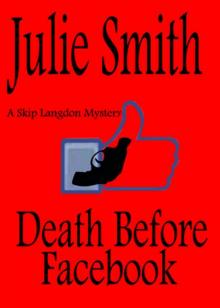 Death Before Facebook (Skip Langdon #4) (Skip Langdon Mystery) (The Skip Langdon Series)
Death Before Facebook (Skip Langdon #4) (Skip Langdon Mystery) (The Skip Langdon Series) P.I. On A Hot Tin Roof
P.I. On A Hot Tin Roof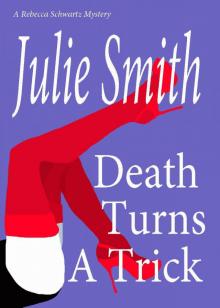 Death Turns A Trick (Rebecca Schwartz #1) (A Rebecca Schwartz Mystery) (The Rebecca Schwartz Series)
Death Turns A Trick (Rebecca Schwartz #1) (A Rebecca Schwartz Mystery) (The Rebecca Schwartz Series) The Axeman's Jazz (Skip Langdon Mystery Series #2) (The Skip Langdon Series)
The Axeman's Jazz (Skip Langdon Mystery Series #2) (The Skip Langdon Series)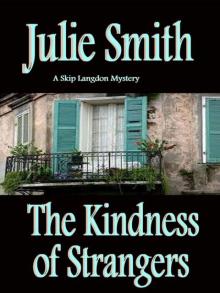 The Kindness of Strangers (Skip Langdon Mystery #6) (The Skip Langdon Series)
The Kindness of Strangers (Skip Langdon Mystery #6) (The Skip Langdon Series) Louisiana Hotshot
Louisiana Hotshot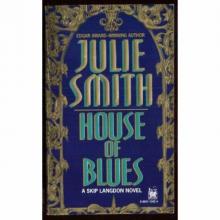 House of Blues
House of Blues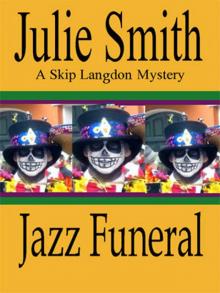 Jazz Funeral (Skip Langdon #3) (Skip Langdon Mystery) (The Skip Langdon Series)
Jazz Funeral (Skip Langdon #3) (Skip Langdon Mystery) (The Skip Langdon Series) Tourist Trap (Rebecca Schwartz #3) (A Rebecca Schwartz Mystery) (The Rebecca Schwartz Series)
Tourist Trap (Rebecca Schwartz #3) (A Rebecca Schwartz Mystery) (The Rebecca Schwartz Series) Louisiana Bigshot
Louisiana Bigshot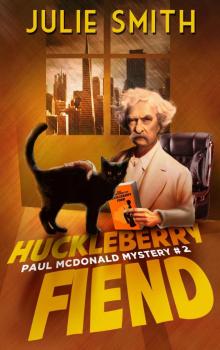 Huckleberry Fiend
Huckleberry Fiend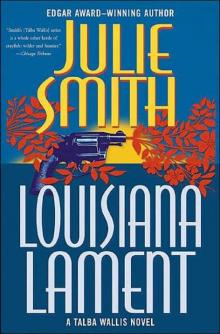 Louisiana Lament
Louisiana Lament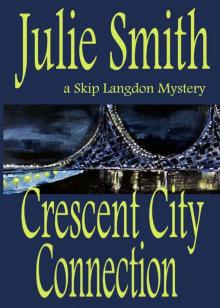 Crescent City Connection (Skip Langdon Mystery #7) (The Skip Langdon Series)
Crescent City Connection (Skip Langdon Mystery #7) (The Skip Langdon Series)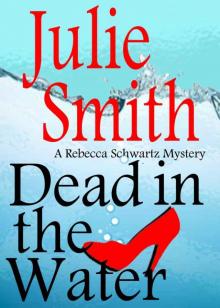 Dead In The Water (Rebecca Schwartz Mystery #4) (The Rebecca Schwartz Series)
Dead In The Water (Rebecca Schwartz Mystery #4) (The Rebecca Schwartz Series) True-Life Adventure
True-Life Adventure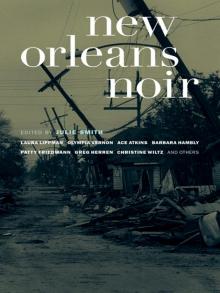 New Orleans Noir
New Orleans Noir